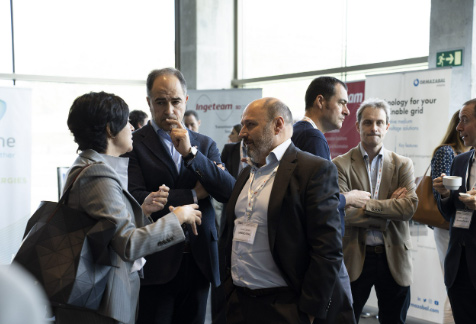
PRESENTATION
Power grids are a key component of the energy system and an essential element to ensure a sustainable energy transition.
This conference aims to promote a forum where experts and researchers from different countries and fields can exchange ideas and discuss the state of the art and progress in the electricity sector.
The event will pay special attention to the geopolitical and strategic aspects that may affect the development of smart grids, both at the global and European level.
There will also be an exchange of experiences and opinions on the digitalization of the grid and on projects and solutions that foster the electrification of energy demand.
In addition, the event will dedicate space for representatives of electricity distribution companies in Spain to share the opportunities and challenges facing the electricity sector.


SESSIONS
SESSION 1
INTERNATIONAL PERSPECTIVE ON POWER GRIDS: STRATEGIC VISION, GEOPOLITICS, SUPPLY SECURITY, SUPPLY CHAIN, CRITICAL MATERIALS.
Geostrategic issues, including the technological and industrial policies of the USA, China and the EU in the context of the so-called “green race”, are of vital importance for a global sustainable transition.
Of particular relevance are the development of large regional power hubs and long-distance electricity interconnections, the role of strategic raw materials in the energy transition and China’s dominant position in the value chains of critical materials. In the European context, the key factors affecting the development of electricity grids include special attention to the European Union and its plan “Grids, the missing link – An EU action Plan for Grids“.
The development of resilient, meshed, digital and smart grids will depend on encouraging the necessary investments and accelerating Projects of Common Interest.
It will also depend on the development and deployment of innovative grid technologies and equipment, and the development of sound planning protocols and regulatory frameworks that create the right incentives.
This should strengthen key value chains connected to smart grids, improve grid security (including cybersecurity) and facilitate the connection of new distributed energy resources.
In this session, international experts representing different organizations will share with the audience their global vision on these issues.

SESSION 2
The process of electrification and decarbonization of the economy depends to a large extent on the digital transformation of electricity grids and the central role of data. In this session, several experts will discuss key issues related to data acquisition, processing and analysis in the context of smart electricity grids.
They will also discuss which innovative digital equipment and solutions can improve the efficiency of planning, operation and maintenance of smart grids and facilitate the integration of distributed energy resources.
In addition, relevant aspects related to digital risks in power grids and technologies and solutions to manage cyber risks and increase grid security will be analyzed.
Some of the leading suppliers of advanced equipment and solutions for power grids will discuss relevant technological innovations and trends, present practical and real examples of their deployment and implementation, and reflect on their operational and environmental impact and how these new technologies will contribute to accelerate the process of electrification and decarbonization of the economy.
Innovation in new equipment, technologies and hardware and software solutions related to the development of smart grids, direct current distribution networks, management and operation of the low-voltage network and applications of artificial intelligence and machine learning solutions in the distribution system are other issues to be discussed.
SESSION 3
This session will focus on the analysis of the current situation of distribution networks and systems in Spain. The expected progress of electrification in the coming years and the objectives set by the National Integrated Energy-Climate Plan (PNIEC) 2023-2030 in the different segments of the electric energy value chain (generation, networks, storage, demand) and in other energy sectors, such as hydrogen, pose a great challenge for distribution network operators and also a great opportunity to promote innovation, foster techno-industrial development and strengthen the drivers of competitiveness of the Spanish economy.
Representatives of electricity distribution companies in Spain will analyze the main regulatory, normative, technological, market and financial challenges faced by Distribution System Operators. The debate will also address how to expand and reinforce distribution networks at the pace required by the expansion of renewable generation, the increase in industrial and residential consumption, in electric mobility and in other segments of activity, such as data centers, and the need to develop sources of flexibility (demand response, electric batteries, flexible generation…) to guarantee a quality and secure supply.
SESSION 4
The focus of this session will be on the advancement of demand-side electrification and the new technological solutions that are being developed to support the integration of renewable energies, electric vehicles, storage facilities and other front-of and behind-the meter technologies..
Participants will analyze how new technological developments in electrical equipment and new digital solutions help to increase the flexibility of the distribution system and favor the deployment of self-consumption solutions and other forms of organization of electrical activities (e.g., energy communities), the penetration of electric mobility, the integration of flexible storage systems and the development of new business models and new sources of economic value and employment associated with the electrification of demand.













